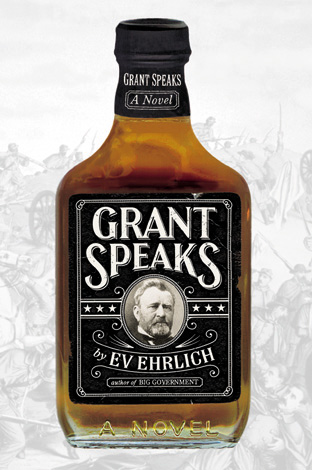
Grant Speaks
کتاب های مرتبط
- اطلاعات
- نقد و بررسی
- دیدگاه کاربران
نقد و بررسی

May 29, 2000
Ehrlich's "real" (read, mock) life of Ulysses S. Grant, cast in the form of the protagonist's lost memoirs, is a cheeky lark. First of all, Grant is an impostor: his real name was Hiram Ulysses Grant. The man who originally bore the name Ulysses S. Grant was the fatuous son of the mayor of Georgetown, Ohio, where both Grants grew up. Ulysses is destined for West Point, but a freak carriage accident kills his parents and robs him of his memory. Hiram's father, Jesse Root Grant, swiftly switches the boys' papers. While the real Ulysses wanders off, Hiram becomes the historical figure. At West Point, the striking rigidity and plain imbecility of Northern military thinking are prefigured in Grant's clash with the professor of military science, Henry Halleck, a pedant obsessed with supply lines. More promisingly, Grant meets another cadet, William Tecumseh Sherman, who becomes his best friend. After graduation, Grant serves as a quartermaster in the Mexican War. On the trail, he ingests peyote and has a spirit vision that predicts Ulysses Grant will be a great leader--but which Grant is the vision signaling? Our hero marries Julia, the daughter of a shiftless and conceited Southern farmer, resigns from the army and becomes a civilian failure, but the Civil War rescues him. Ehrlich's accounts of Grant's battles mix the burlesque with the thrilling. Sherman is a cussing lunatic, and most of the Northern generals are timeservers. Ehrlich's broad, cartoonish style is least successful when he portrays Lincoln as a dumb yokel and his wife as a nymphomaniac. Still, the best scenes in the book, like the description of the Battle of Shiloh, retain some of the power of reality. Grant wins the war, of course, and in Ehrlich's telling becomes a weak president and the tool of the Vanderbilts. Ehrlich's alternate Grant emerges from the uneven humor of the book as a skeptical, humane and ultimately sympathetic figure. Agent, David Chalfant of IMG Literary Agency. Major ad/promo. (June) FYI: Another fictional portrait of Grant, That Fateful Lightning, by Richard Parry, is due out from Ballantine in June (Forecasts, May 1).

June 15, 2000
Ulysses S. Grant, an undistinguished president who owed his office to a nation grateful for the long-awaited victory in the Civil War, is a historical novelist's dream subject. Living during a tumultuous time and marked by both honor and humiliation, he projected an ambiguous persona. Ehrlich takes this paradoxical man for a wild ride through history. Casting Grant as the evil twin of the real Ulysses S. Grant, an upright neighbor whose identity he stole, Ehrlich hits all the factual highlights, and his inventions have a satirical, gut-busting effect. Like his earlier Big Government (LJ 9/15/98), the new novel humorously dissects the nature of political power and its odd coincidences. In contrast, Byrd's book, though slower to excite the reader, is a serious exploration of the life and times of Grant. Its strong suit is the description of key battles and postwar events through the eyes of a one-armed veteran of the war. For Byrd, the period is a vast canvas on which he limns not only the central figure of Grant but also the lives affected by his habitual fecklessness, wartime hardness, and peacetime obtuseness. Of the two books, Ehrlich's book is a winner for larger fiction collections, while military fiction collections will be enhanced by the Byrd title. [Grant is also portrayed in Richard Parry's That Fateful Lightning: A Novel of Ulysses S. Grant (LJ 5/1/00). --Ed.]--Barbara Conaty, Library of Congress
Copyright 2000 Library Journal, LLC Used with permission.

June 1, 2000
%% This is a multi-book review. SEE the title "That Fateful Lightning" for next imprint and review text. %% ((Reviewed June 1 & 15, 2000))(Reprinted with permission of Booklist, copyright 2000, American Library Association.)

























دیدگاه کاربران